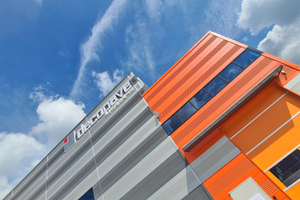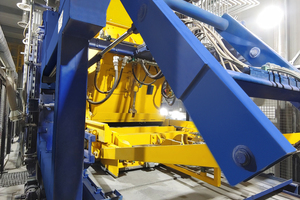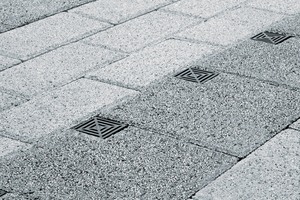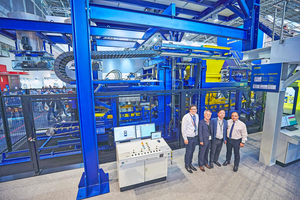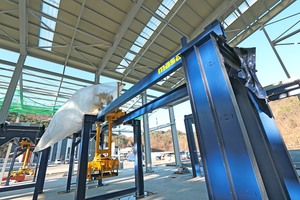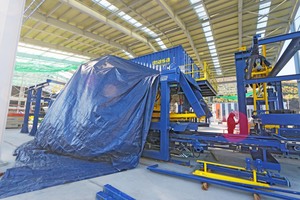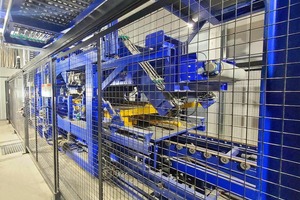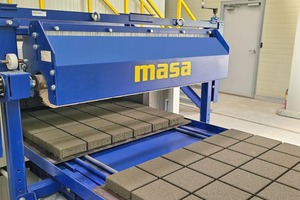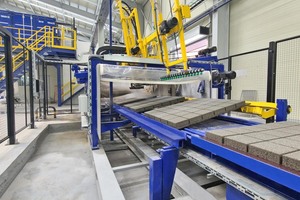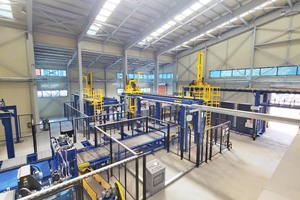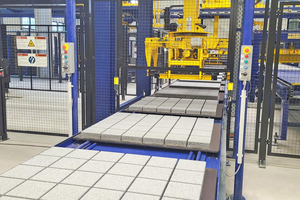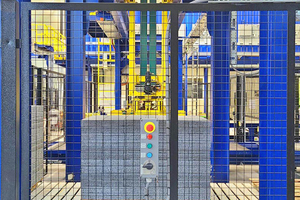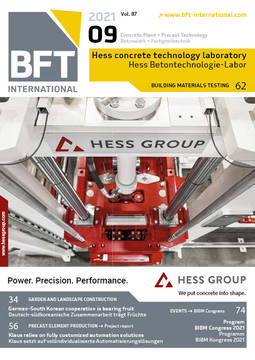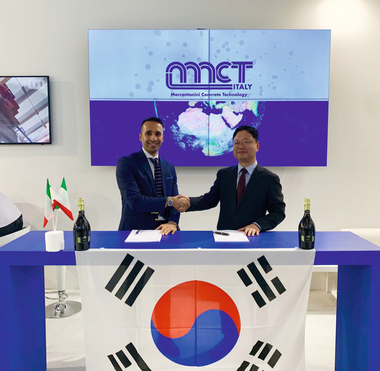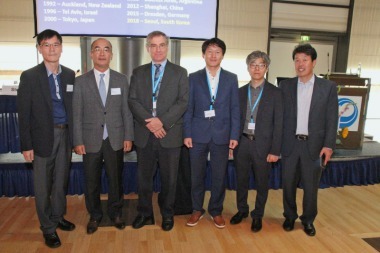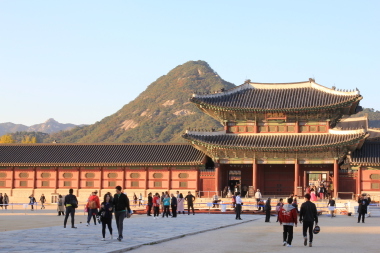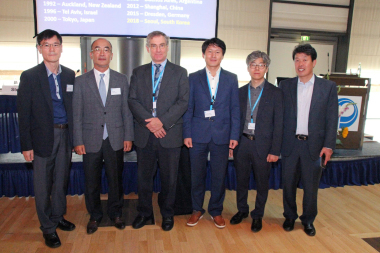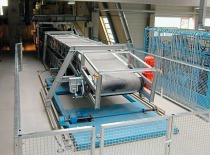Innovation meets Leadership: German-South Korean cooperation is bearing fruit
When choosing the ideal concrete block production plant, Decopave trusted in well-known German manufacturers: With a high-tech block production plant from Masa GmbH and a chamber system from Rotho for hardening the concrete blocks, the production of high-quality paving stones is running at full speed.
In 2012, the South Korean company Decopave Co., Ltd. entered the Asian market as an absolute newcomer to concrete block production. In 2018, the paving stone manufacturer had already fought its way into second place among the South Korean market leaders. Based in Busan, Korea’s second largest city, the company brought a breath of fresh air to the industry by manufacturing innovative, functional products making a name for itself in just nine years with excellent quality, original design, and advanced technology. Park Moon-suk, CEO of the company, befuddled the saturated South Korean market with his ideas. Decopave relied entirely on environmentally friendly products that have been certified and patented. The company has received multiple awards from the Korea Institute of Patent Information (KIPI) and is also certified by SBA, a business development institution for SMEs (Small and Medium-sized Enterprises), run by the Seoul metropolitan government.
Decopave and the affiliated Technology Research Institute attributed the success story in many ways to a close technical cooperation with well-known international partners. Thanks to cooperation with German and Japanese companies, modern technologies have been incorporated into the development of new concrete products. When choosing the ideal concrete block production plant, Decopave also focused on well-known German manufacturers: With a high-tech block production plant from Masa GmbH and a chamber system from Rotho for hardening the concrete blocks, the production of high-quality paving stones is running at full speed. It is also worth looking at the construction sites. Here, Decopave supports the laying work by introducing advanced paving equipment from overseas and is also promoting the training of effective laying techniques on site.
What if the streets we walked on automatically clean our environment every day?
Like many other large cities, the South Korean capital Seoul fights against high levels of air pollution year after year. Another problem is the summer monsoon, which is responsible for torrential rains and floods within the city. The counterpoint to Seoul is only 50 km westwards: the “Smart City” Songdo, is a showcase project that attracted a lot of international attention. The city, which is still very young, promises an environmentally friendly, resource-saving, and safe coexistence with the help of modern technologies. Songdo also serves as a model for urban developers in the megacity of Seoul. The metropolis should be green, environmentally friendly, and full of life in the future. It takes many visionaries to master this challenge. Mr. Park Moon-suk, CEO of Decopave, sees himself as a piece of the puzzle in this planning concept. Following an inner drive, he goes through the world with open eyes, recognizes problems, and strives for solutions.
It is therefore not surprising that Decopave is committed to being a specialist in urban water management. The company strives to deliver high quality concrete blocks and pavers with differentiated water permeability and non-slip properties. The Aqua Core Block developed for this purpose with a high degree of permeability has a very good drainage capacity, which allows rainwater to drain off in a short time. By absorbing and distributing the water, road flooding is reduced. In addition, the underflow function of the paving stones contributes to the growth of nearby plants and minimizes the heat island effect.
By cooperating with a German company, Decopave embarked on another path towards the environmentally friendly capital. In 2018, an initial test area with paving stones was laid in Seoul, to which a special concrete additive was added during production. When exposed to light, a photocatalytic reaction is triggered on the paving stone surface, which converts toxic nitrogen oxides (NOx) from the air into non-toxic nitrate. Mr. Park likes to compare the positive effect with ginko trees, which are traditionally planted in Seoul to improve air quality: “In relation to a paved area of 1 m², the air purifying power of our product can be compared to that of nine ginko trees. With the help of rain and the sun, the air can be cleaned even overnight.”
These products are manufactured in an automated production facility in Danyang, around the clock. The expansion of the production capacities should follow the European ideal. This is where the German company Masa came into play: The technical know-how and the wealth of experience in the construction of reliable and efficient concrete block making plants - as well as the comprehensive Masa Lifetime Service - convinced the delegation from Decopave. After intensive preliminary discussions, the delegation who visited the site in Andernach, Germany at the beginning of 2019 finally got its own picture of the advantages of the latest Masa machine generation. During their visit, the Masa XL-R concrete block making machine was already pre-assembled in the Andernach production halls and was subjected to the final functional tests for the upcoming Bauma 2019, the world‘s leading trade fair. Mr. Park was impressed by the potential of the XL-R and symbolically sealed the partnership with Masa during bauma in Munich. The features of the new machine presented there have now passed their practical test with flying colors after the entire production plant was commissioned.
The new Masa machine generation: XL-R
Compared to the classic Masa XL series, the new XL-R impresses with an even faster cycle time and upscale standard equipment. The XL-R 9.1 machine delivered to Decopave for the production of concrete blocks with and without a facemix layer is designed for a production pallet size of 1400 x 1100 mm. The drive of the vibrators is amplitude controlled.
The synchronization of the right and left mould bearings, guided by four columns with a diameter of 120 mm, is implemented using servo-hydraulics. The necessary working pressure is generated by two flow-controlled pumps with pressure accumulator support. The regulation takes place via servo valves placed close to the components. For each servo-axis (such as main mix concrete filling box, face mix concrete filling box), the optimal control variable is determined and controlled at all relevant positions by means of a position measuring system and pressure measurement. The high-quality control as well as short reaction times and overlapping movements lead to an optimization of the cycle time.
A repeatable and exact filling of the main- and face mix filling box is carried out by means of a laser level indicator. To simplify and speed up set-up times, the machine is equipped with a fully automatic mould change. If the height of the filling unit needs to be adjusted, the XL-R also offers a convenient solution with the filling box being guided by continuous running rails. The rails are fixed to the compaction unit by means of magnetic clamping, that can be opened automatically. Therefore, manual loosening or tightening is not necessary.
The freshly manufactured products are transferred dynamically and quickly from the servo-controlled production pallet feed to the synchronized lowering device designed as a V-belt conveyor. From here the electrically controlled walking beam conveyor takes over the transport. The effective use of energy is very important to Masa. Therefore, energy-efficient drive concepts are implemented in the XL-R, which are based on an intelligent converter network (vibrators, servo- production pallet feed, and lowering device with V-belt conveyor).
Decopave decided on some optional features
When designing the production plant, Decopave carefully considered the current and future markets and decided on some optional features when equipping the machine: Contactless sensors are mounted below the vibration table. If necessary, they are used to measure the amplitude of the vibration table during production. This allows the production process to be monitored and upcoming maintenance work to be planned better.
At Decopave, the oscillating grate drive usually used in the main mix concrete filling box has been replaced by a hydraulic eccentric drive. This eliminates the pressure peaks that arise when switching over a conventional hydraulic cylinder. The oscillating grate is driven by a hydraulic motor. This is regulated by a proportional valve, whereby the speed can be set variably. The rotary movement of the motor is converted into a linear movement due to an eccentric connection with a push rod, which moves the oscillating grate. The hub of the oscillating grate can be changed by replacing the eccentric.
In lieu of the standard main concrete silo, the Decopave machine has an enlarged main mix concrete silo (total volume approx. 1,700 l). The silo is equipped with two independently adjustable hydraulically driven silo flaps and a volumetric laser-controlled level measurement device to monitor the silo level. Both silo flaps can work independently of each other to ensure constant filling of the filling box. The filling level is monitored by means of a laser level measurement in the filling box and the silo flaps are controlled accordingly. This equipment variant is particularly advantageous for tall products, as the filling is done in two places. In addition to the two mentioned concrete silo variants with one or two silo flaps, Masa also offers a filling via dosing belt, which can be an alternative option for the production of high-quality multi-color products. The quantity of concrete to be poured is then determined by volumetric dosing. In this way, only the concrete required per cycle is put into the filling box. By placing the concrete over the entire surface in the chamber of the filling box, the blending of the concrete is reduced, and the reproducibility of the final product image is increased. In addition to the static loading of the chamber of the filling box, the filling of the main mix concrete filling box can also take place synchronously with the movement of the filling box, which leads to a reduction in the pouring cone.
A driven bottom plate (optionally available) was used for the optimal feeding and distribution of colored face mix concrete in the filling box. This makes it possible to fill the mould only in the backward movement of the filling box. The bottom plate is opened and closed using a hydraulic cylinder. Additional mixing of the concrete in the mould by the movement of the filling box is prevented and the reproducibility of the multi-colored product appearance is increased.
Automation and control concept
The uniform operation and visualization of the system components is implemented using the “Factory Automation System Tool“ developed by Masa. The latest Siemens CPU generation S7-1500 is coming into operation using the TIA portal, which enables the patency of automation software, hardware, and service. All areas of the system are controlled centrally, and the data is available from one point. Intuitively operable, the control enables simple communication with the system components and transparent visualization of the system data. This is supported by the latest “Live Motion” visualization generation. Moving parts of the block making machine as well as the finger car, production pallet storage, and Cuboter are animated realistically and in real time.
The personalized access to the system control takes place via a transponder or a chip card. A time-controlled automatic logout is provided. Data access is defined in an authorization concept. With the RFID system, the previous password entry is no longer necessary, but can still be used.
The right component for every application
The versatile options of the Masa XL-R 9.1 give the customer a wide breadth of possibilities for creativity. To ensure that the high-quality products get sensitive handling right up to the last second, Decopave also preferred the tried and tested Masa components in the subsequent ring plant.
The fresh products can run through the Masa paver washing unit immediately after production. Fine fractions of the aggregates and the cement films are removed by a combined spray and surge process: In the first station two oscillating high-pressure jet nozzle arms move over the surfaces for washing. The second station consists of a low-pressure jet nozzle arm and a gush water tank, which are moved across the surface to rinse out the remaining cement particles. The last station is equipped with a jet nozzle arm for compressed air to blow off the remaining water. The high-quality appearance of the face mix materials is particularly emphasized by this three-stage process. This gives the product its characteristic appearance. The market for such washed-out products is booming in South Korea. Paving stones with exciting surfaces and a playful look can be found in many places in Seoul and other cities. Cut glass or fluorescent grains are often used to give the products an individual touch. „Everything that illuminates, are my stones.“, says Mr. Park in a nutshell. Decopave‘s paving stone production is running at full speed.
For automated quality assurance on the wet side transport, the system has a pneumatically driven tilting device so that the production pallet can be raised to a defined angle. Products that do not meet the quality requirements slide off the production pallet into a waste container due to the inclination. They can be sorted out before hardening and disposed of by the customer or sent to a recycling process. Furthermore, after cleaning the block making machine, any residual material that may have remained on the empty production pallet can be removed.
Reliable Masa standard components
The freshly produced stones are transported to the curing area via the reliable Masa standard components including a walking beam conveyor, elevator, and finger car (16 t load capacity with 20 floors and a floor height of 400 mm). The curing takes place in a curing chamber system from Rotho, which has a total capacity for 6400 production pallets (6000 production pallets + 1 empty chamber). By means of a finger car, buffer finger car, lowerator, and walking beam conveyor the cured products are transported to the energy-efficient Masa Cuboter, which works fully electrically and reduces operating costs. This modern cubing technology, in combination with other packaging systems ensures that the final products are ready for dispatch.
Decopave cubes the end products on transport pallets. Since the highest possible degree of automation should also be achieved at this point, the system layout provides for an extensive transport pallet storage system with a grab. The component in portal design has a movable lifting / lowering device with pneumatically driven clamps to hold the transport pallets. The drive of the running gear and lifting unit is done by frequency-controlled gear motors. Starting from three positioning stations, the grab places the transport pallet directly onto the cube transport. This solution provides Decopave with the required time buffer and reduces the need to refill the transport pallets accordingly.
The system ring is closed by a proven Masa system: the cross transport with grab transports the cleaned and turned production pallets back to the block making machine or can temporarily store up to 1080 production pallets in stacks in designated spaces. With this pallet buffer storage, different cycle times on the wet and dry side can be compensated. The production and handling side can work independently of each other - a big advantage in terms of flexibility within the system.
Creative crisis management and future plans
The loading and subsequent shipping of the extensive Masa production facility to South Korea began on schedule in August 2019. During the assembly phase however, a hurricane was brewing, that would affect entire world. The Covid-19 pandemic had spread across the world since December 2019.
To enable a quick start to production, an enormous commitment and extensive cooperation between the two companies were made, leading to a solution in a very short time. The result was coordinating the commissioning primarily via remote desktop connection. Only the final commissioning work and test runs had to be carried out on site with the Masa team. At the end of May 2020, the experienced specialists traveled to South Korea again. Decopave took care of entry modalities in an exemplary manner; contacting the local health authorities and organizing the quarantine-compliant accommodation of the commissioning personnel. Daily calls to the authorities became routine, as well as checking body temperature and using tracking apps. Under strict conditions, with a remarkable effort and creative solutions on the part of Decopave and Masa, the test runs were finally completed successfully. Decopave has been manufacturing trend-setting concrete products on a large scale since June 2020. Starting with 1-shift production, the new plant in Danyang is now running in 3-shift operation. Since then, more than 5000 m² new concrete blocks are produced every day and have been decorating streets, sidewalks, squares, and floors throughout the country. “We work on a lot of large projects. For example, we supply mega residential parks with our concrete blocks. The requirements and specified standards by the municipalities are very high, but with our process and with our products we can easily meet them,” said Park. He already has clear expansion plans in mind for the future. “The demand for our innovative products is also high outside of Korea. Therefore, efforts are being made to expand our growth to other countries together with our partners from Europe, in particular with Masa GmbH from Germany.”

